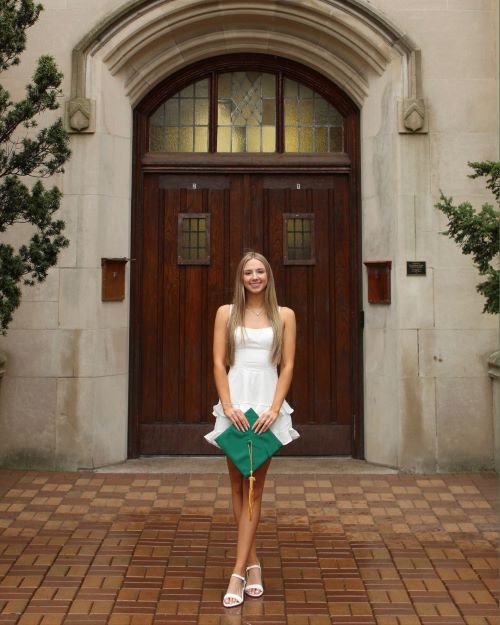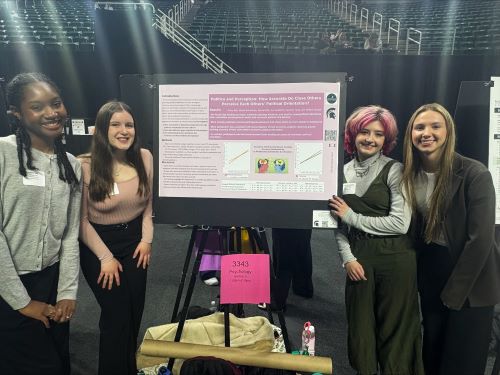PSY Student Researcher Spotlight with Ava Sudderth
April 28, 2025 - Shelly DeJong
 Ava Sudderth is graduating with a degree in psychology with a minor in Environment and Health. Ava is a student researcher in Dr. William Chopik’s lab where they are researching to see if individuals can accurately assess the political beliefs of those close to them.
Ava Sudderth is graduating with a degree in psychology with a minor in Environment and Health. Ava is a student researcher in Dr. William Chopik’s lab where they are researching to see if individuals can accurately assess the political beliefs of those close to them.
How did you end up on your major minor combo?
I had always been interested in psychology, but I wasn’t sure what path I wanted to take when I first arrived at MSU. By my sophomore year, after taking a few prerequisite courses, I decided to major in psychology. I realized that psychology was something I was really passionate about and wanted to pursue. I also chose to minor in Environment and Health which connects with psychology a lot. In one of my Environment and Health classes, we discussed how issues like oppression, racism, sexism, homophobia, and transphobia are all interconnected with our environment and significantly impact community health. Some communities are more vulnerable and, as a result, are more affected by environmental issues like pollution. Learning about these connections was incredibly eye-opening for me. It’s so interesting to see how everything ties together. In a major like psychology, the concepts we study often overlap. Each class builds on the previous one, using similar ideas and themes, which makes the learning experience cohesive and enriching. I appreciate how all my coursework is connected.
What did you present at UURAF?
My group and I presented our research on how accurately and how biased we perceive the political orientation of those close to us, such as family members, friends, or romantic partners. Our focus was on how accurately or biased individuals can accurately perceive the political beliefs of their own close relationships. Our study examined different dimensions of political orientation, including economic and social perspectives, as well as an overall assessment.
We analyzed existing data from a sample of 373 dyads with a total of 746 participants. These participants included pairs such as family members, partners, or close friends. They completed a survey regarding their political views, rating their own beliefs and those of their partners. Additionally, we gathered information on relationship satisfaction, closeness, and the duration of their relationships. This aspect was particularly interesting since some participants were family members who had known each other for many years—some for as long as 20 years. The data provided valuable insights from that perspective.
Did you have any findings?
 We discovered some really fascinating and somewhat surprising results. For instance, we found that when it comes to economic political orientation, the closer you rated yourself to your partner, the less accurately you were able to determine their political beliefs. This was intriguing. We speculated that if you're very close to someone, you might feel content with your differences, leading you not to try and align their views closely to your own.
We discovered some really fascinating and somewhat surprising results. For instance, we found that when it comes to economic political orientation, the closer you rated yourself to your partner, the less accurately you were able to determine their political beliefs. This was intriguing. We speculated that if you're very close to someone, you might feel content with your differences, leading you not to try and align their views closely to your own.
Additionally, we examined the concept of assumed similarity—whether individuals perceive their partners as more similar to themselves. For economic political orientation, our results indicated that people who were more satisfied in their relationships were less likely to assume that their partner shared their views. Instead, they rated their partner's political orientation more independently.
We were also curious to see if being at one end of the political spectrum would lead people to think their partners are similar in their political beliefs. We found that for social political orientation, individuals with more extreme political views—whether very liberal or very conservative—tended to rate their close friends or partners more similar to themselves. These findings aligned with our hypotheses that political extremity plays a role in how accurate one perceives political orientation of their friend, family, or partner, as well as our hypothesis that people will be accurate at perceiving political orientation of their partners.
Why do you think it's important to do this research?
I think it's really important to study this. Politics are becoming increasingly significant, and as we can see, it's everywhere right now. We thought it would be interesting to explore whether people can accurately gauge political orientation of a family member, close friend, or romantic partner. Previous literature suggests that individuals can be quite accurate at determining someone’s political leanings from just a photo, which is both fascinating and surprising. We were curious about how accurate this perception might be in personal interactions.
We also want to emphasize the need for future research to investigate the differences in social and economic political orientation. The differences we found in our results warrant further exploration to understand why they exist. Overall, this type of research is really crucial, and more work needs to be done.
Did anything surprise you about psychology research?
Many of the classes I've taken prepared me for this, yet I didn't fully realize how in-depth the research process is, especially regarding the databases they use to interpret and code the data. It requires a deep understanding of the methods and tools used in data analysis, which I hadn't anticipated. If you don't understand how to analyze the data they provide, it can just look like a jumble of random numbers and letters. Without that context, figuring out whether the data is significant is tough. I was really surprised by how much effort goes into this work.
Do you have any favorite classes?
I loved Psychology of Women. Dr. Lucy Thompson is amazing, and that class was so enlightening. I was also fortunate to be an Undergraduate Learning Assistant for that class as well. I’ve also taken two of Dr. Jonathan Weaver’s classes, Social Psychology and Stereotypes, Prejudice and Discrimination, which I really loved. Dr. Chopik’s Relationships Throughout the Lifespan was really interesting, too.
Would you like to give a shoutout to anyone who has helped you in your journey?
I would definitely say that Dr. Thompson has been an incredible influence on my academic journey. Working with her as an Undergraduate Learning Assistant was really helpful for my journey as a student. Her knowledge and passion for her work really shines through. She is excellent at explaining concepts, and you can truly see how much she loves what she does.
Additionally, Dr. Chopik has also been very supportive. I didn't know a lot about research initially, and he provided me with the opportunity to be a research assistant in his lab and was always available to answer my questions. He never seemed annoyed by my many questions, and he was always so friendly and funny, too. My peers who are working with me on this research project have also been so helpful to my journey, Hyewon Yang, Lauriel Ellis, Nicole Bommarito and Avery Bell have put so much time and effort into this project and it wouldn’t have been possible without them.
What’s next for you after graduation?
I'm currently applying for internships in the field of psychology. My plan is to attend graduate school, but I'm aiming to gain more experience before I do so. I've decided to take a year to really explore different specialties and determine which area of psychology I want to focus on.

